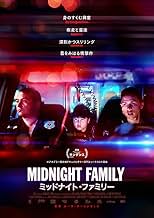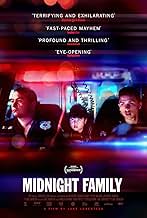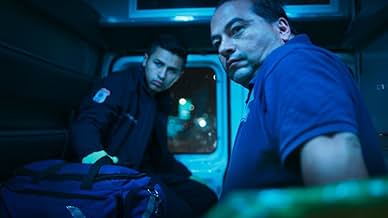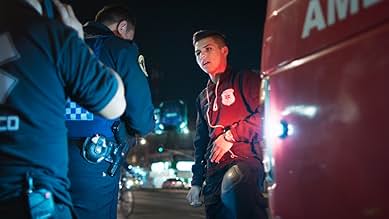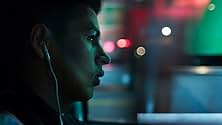IMDb RATING
7.4/10
2.1K
YOUR RATING
In Mexico City's wealthiest neighborhoods, the Ochoa family runs a private ambulance, competing with other for-profit EMTs for patients in need of urgent help.In Mexico City's wealthiest neighborhoods, the Ochoa family runs a private ambulance, competing with other for-profit EMTs for patients in need of urgent help.In Mexico City's wealthiest neighborhoods, the Ochoa family runs a private ambulance, competing with other for-profit EMTs for patients in need of urgent help.
- Awards
- 26 wins & 26 nominations total
Juan Ochoa
- Self
- (as Juan Alexis Ochoa)
Josue Ochoa
- Self
- (as Josué Ochoa)
- Director
- Writer
- All cast & crew
- Production, box office & more at IMDbPro
7.42.1K
1
2
3
4
5
6
7
8
9
10
Featured reviews
To the Ochoas and all other paramedics: You're all the real heroes.
I watched this documentary at the beginning of the Corona outbreak in Europe. I can't imagine what will happen when Mexico will get hit hard like here. It's probably only a matter of months before there will be hundreds of thousands casualties over there. What a heartbreaking but also heartwarming documentary I just watched. Heartbreaking when you see that in a big country like Mexico they still can't get rid of all those corrupt people. You would think that after so many years they would do something about it but instead you still see policemen bribing people that actually try to save peoples lives. The police is supposed to serve and protect but in a country like Mexico (well not only in Mexico) those b*stards are still allowed to play their dirty games and nobody does anything about it. They should be ashamed, I just hope one day they will need an ambulance and that they leave them rotting in the streets. Heartwarming when you see the Ochoa family doing their best to save people, most of the time they just don't get paid but they still continue trying to make a difference, trying to save people abandonned by their government. It's a hard documentary, but very well made, one that makes you think that we're so lucky not to live in a country like Mexico. I don't think we realize how lucky we are sometimes. My utter respect to the Ochoa family and all other independent paramedics that try to survive in such a corrupt country, and my utter disgust for those filthy pigs not worth being called humans.
Captivating
Midnight Family is a captivating documentary. As an audience, the textual of the documentary seems to me like a interesting and successful mix of documentary and feature film. What I mean is that the content of the documentary is real thing that happened to the family and the filmmaker, while the shooting, neon-light style of lighting, storytelling and so on are quite delicate. The night scenes occupy the majority of the documentary body may be a reason as well. The director believes that there should not be a set boundary between the style of documentary and fictional film.
The documentary was shot in one-person crew. In other words, Luke Lorentzen himself. He had two shooting cameras with him. One of which was set on the car front window and the other was in the back of the car. While the director collaborated with his Mexican friend in the editing as to distance himself from the footage, as he admitted in a dialogue in Hong Kong. Because he himself witnessed those scenes, and the footage may work for him in the way that does not work for common audiences.
The director spent around a hundred days within the 2-3 years documenting the midnight family and made some follow-up shooting which at the end hold up the spiritual essence of the documentary. The director intends and manages to show audiences the undertow of the business of Mexican ambulance and the ordinary people within.
The director graduated from Stanford University.
The documentary was shot in one-person crew. In other words, Luke Lorentzen himself. He had two shooting cameras with him. One of which was set on the car front window and the other was in the back of the car. While the director collaborated with his Mexican friend in the editing as to distance himself from the footage, as he admitted in a dialogue in Hong Kong. Because he himself witnessed those scenes, and the footage may work for him in the way that does not work for common audiences.
The director spent around a hundred days within the 2-3 years documenting the midnight family and made some follow-up shooting which at the end hold up the spiritual essence of the documentary. The director intends and manages to show audiences the undertow of the business of Mexican ambulance and the ordinary people within.
The director graduated from Stanford University.
Bringing out the dead. But REAL.
For fans of Scorsese's film, this'll be an even bigger treat. You feel strongly for the Ochoa family and their committment to goodness and a cause. They're all such real people. The teenager needs to talk and offload things onto his girlfriend, the uncle is full of fast food. The kid eats ruffles all the time and bunks school. Everything about is so real. And it's also thrilling because the subject is fast moving. Watched at the Mumbai Film Festival.
the races are on
Greetings again from the darkness. It would be easy to question why a family would choose to run a private ambulance service in a city where they may or may not get paid. It's only when we know one stunning statistic that their reasoning becomes clear. In Mexico City, the government operates only 45 ambulances for a population of nearly 9 million people. Director-cinematographer-editor-producer Luke Lorentzen takes us inside the ambulance with the Ochoas as they work the streets in the business they've run for almost 20 years ... it's a business that fills a necessary gap in emergency services.
Teenager Juan is the most talkative of the crew that includes his father, a younger brother and a friend of the family. We are never certain whether their service or vehicle is properly licensed, whether they are certified, or even if actual licenses and certifications exist. What we do know is that when a medical emergency occurs, a two-plus hour wait for a city ambulance makes the private services much more appealing ... and, quite frankly, necessary.
Mr. Lorentzen serves up some terrific camera work, focusing mostly on the family rather than the patients they are providing service for. In the blink of an eye, the Ochoa family goes from utter boredom to a life-and-death situation where response time is crucial. Timing is important not just for medical reasons, but for competitive ones as well. Often there are two races occurring - the race to reach the patient, and the race against another ambulance. What is clear is that once on the scene, the Ochoas are very professional and caring ... whether it's a gunshot wound, a child that's fallen four stories from a window, or a woman who has been physically assaulted by her boyfriend (and needs a hug, as well as an ambulance).
Corruption is everywhere in this cutthroat industry. From a government who refuses proper care for its citizens to a police force accepting bribes to private ambulance services on retainer from certain hospitals. For the Ochoas, the police scanner is as vital to their business as the medical supplies in the back where the youngest brother munches chips between calls. A loudspeaker is necessary as they race through the city streets admonishing cyclists and cab drivers to get out of the way for a medical emergency.
The Ochoas treat hundreds of patients each year, and when they aren't responding to calls, they are scrubbing the blood from the vehicle or resting up for another stressful night. We hear their philosophy in providing care for those who might not otherwise get to the hospital on time, and we understand this family does care very much about their chosen profession ... this in spite of the fact that so many refuse to pay them, or simply can't afford to. It's a constant hustle that keeps the family on the edge financially, although they can hold their head up high knowing they provide a valuable service. Lorentzen's camera work ensures we feel the intensity and stress of each and every call.
Teenager Juan is the most talkative of the crew that includes his father, a younger brother and a friend of the family. We are never certain whether their service or vehicle is properly licensed, whether they are certified, or even if actual licenses and certifications exist. What we do know is that when a medical emergency occurs, a two-plus hour wait for a city ambulance makes the private services much more appealing ... and, quite frankly, necessary.
Mr. Lorentzen serves up some terrific camera work, focusing mostly on the family rather than the patients they are providing service for. In the blink of an eye, the Ochoa family goes from utter boredom to a life-and-death situation where response time is crucial. Timing is important not just for medical reasons, but for competitive ones as well. Often there are two races occurring - the race to reach the patient, and the race against another ambulance. What is clear is that once on the scene, the Ochoas are very professional and caring ... whether it's a gunshot wound, a child that's fallen four stories from a window, or a woman who has been physically assaulted by her boyfriend (and needs a hug, as well as an ambulance).
Corruption is everywhere in this cutthroat industry. From a government who refuses proper care for its citizens to a police force accepting bribes to private ambulance services on retainer from certain hospitals. For the Ochoas, the police scanner is as vital to their business as the medical supplies in the back where the youngest brother munches chips between calls. A loudspeaker is necessary as they race through the city streets admonishing cyclists and cab drivers to get out of the way for a medical emergency.
The Ochoas treat hundreds of patients each year, and when they aren't responding to calls, they are scrubbing the blood from the vehicle or resting up for another stressful night. We hear their philosophy in providing care for those who might not otherwise get to the hospital on time, and we understand this family does care very much about their chosen profession ... this in spite of the fact that so many refuse to pay them, or simply can't afford to. It's a constant hustle that keeps the family on the edge financially, although they can hold their head up high knowing they provide a valuable service. Lorentzen's camera work ensures we feel the intensity and stress of each and every call.
Watched/Read-the-subtitles at MAMI Film Festival Mumbai!
Realistically showing the real life struggles of private ambulances in Mexico City.
With tons of Insert/Extreme-Closeup/Point-of-view shots, it keeps going upwards and downwards. Sometimes feel like a well written/acted family-drama, other times just a documentary, that's trying too hard.
Did you know
- TriviaDirector Luke Lorentzen edited the film as he was shooting for 60-70 nights over the course of 3 years. By the end of 2017 a locked cut was finished and submitted to Sundance, but the film got rejected. This made Lorentzen think that there might be more of a story to tell, so he went back to Mexico City to shoot for another 2 1/2 weeks, where ultimately ~80% of what ended up in the finished film was shot.
- ConnectionsReferenced in The Rodolfo Rivas Project: Luke Lorentzen (2019)
- SoundtracksMe Olvidé de Vivir
(J'ai Oublié de Vivre)
Music by Jacques Revaux
French lyrics by Pierre Billon
Spanish lyrics by Julio Iglesias
Performed by Julio Iglesias
- How long is Midnight Family?Powered by Alexa
Details
- Release date
- Countries of origin
- Official sites
- Language
- Also known as
- Опівнічна родина
- Filming locations
- Production companies
- See more company credits at IMDbPro
Box office
- Gross US & Canada
- $42,310
- Opening weekend US & Canada
- $3,030
- Dec 8, 2019
- Gross worldwide
- $51,712
- Runtime
- 1h 21m(81 min)
- Color
Contribute to this page
Suggest an edit or add missing content




